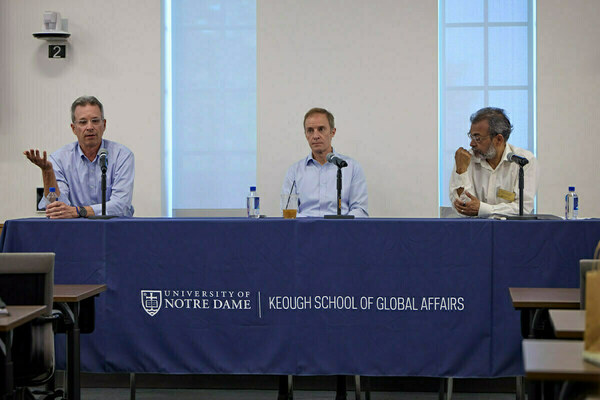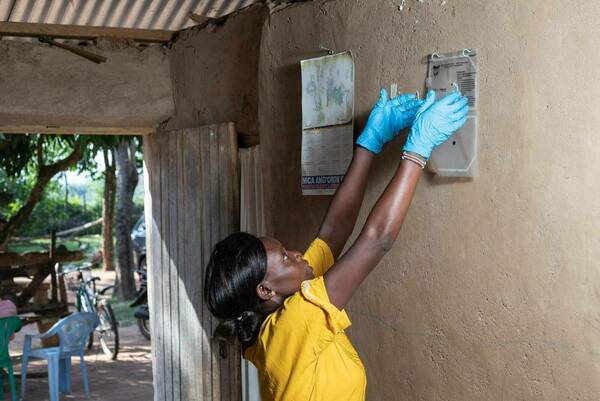Energy experts: a sustainable U.S. future calls for a balanced approach

With energy demand in the United States projected to soar amid rapid technological change, two industry experts offered candid visions for the future during the panel discussion “Energy Policy in the U.S.: Is a Sustainable Future Possible?” at the University of Notre Dame’s Keough School of Global Affairs.
Moderated by Arun Agrawal, the Pulte Family Professor of Development Policy at the Keough School, the conversation brought together Jeff Dellapina, CFO of the global energy trading firm Vitol Group, and Tom Kuster, CEO and co-founder of the renewable energy company Merit Controls.
Dellapina and Kuster agreed on the urgency of upgrading the U.S. energy system, but differed in emphasis: Dellapina advocated for a balanced mix including hydrocarbons and nuclear power, while Kuster focused on the promise—and the challenges—of renewables and storage.
A growing demand—and a bigger challenge
Agrawal, the inaugural director of Notre Dame’s Just Transformations to Sustainability Initiative, opened the discussion with a series of slides showing the history and future projections of U.S. energy consumption. Demand, he noted, is forecasted to grow significantly—driven not only by population and economic expansion but also by artificial intelligence and data infrastructure.
Kuster, whose mechanical engineering background led him from an initial focus on industrial energy efficiency to a more recent focus on renewable generation, underscored the implications of a 3 percent annual growth in electricity demand.
“That may sound modest,” Kuster said, “but when you’ve been growing at 0.1% for decades, it’s a massive shock to the system. We’re going to need billions in investment just to keep up.”
Kuster pointed to AI and data centers as emerging sources of “essential baseload” power demand—loads that cannot be turned off or scaled down easily. "If we’re truly committed to AI infrastructure, this isn’t hypothetical,” he said. “The demand is real."
A case for balance—and realism
Dellapina, a Notre Dame alumnus who helps lead one of the world’s largest hydrocarbon traders, called for a pragmatic understanding of sustainability—one that encompasses economic viability, geopolitical strategy and environmental goals.
Dellapina contrasted the U.S. and European approaches, cautioning against relying too heavily on a single energy source or creating restrictive regulations. He noted that Europe’s choices narrowed its options, while the U.S., despite political divisions, has developed a more resilient energy foundation.
Dellapina emphasized the importance of including nuclear and natural gas alongside renewables. Pointing to UK economist Dieter Helm’s analysis of Europe’s energy costs, he stressed that achieving a sustainable future requires nuclear and gas to complement clean energy investment.
The importance of infrastructure

Dellapina and Kuster agreed that infrastructure—especially the electrical grid—is the often-ignored keystone in any sustainable energy future.
Kuster emphasized the need to maintain and expand the transmission grid to handle intermittent sources like solar and wind. “Most outages aren’t because of a power plant failure,” he said. “It’s the wires. It’s distribution. It’s older systems experiencing periods of underinvestment in maintenance.”
Citing examples from Texas, where a $7 billion investment in grid capacity enabled wind power to reach urban centers, Kuster argued that grid improvements can bring surprising returns. “Texas is a great case,” he said. “It’s windy at night, and you’ve got a lot of sun. And despite being oil-and-gas country, they’ve done a lot with renewables.”
Dellapina echoed the importance of grid resilience, but warned that market forces alone can’t manage the scale of the challenge. He noted that while the private sector has been highly responsive, government action is needed to maintain balance and protect taxpayers from bearing the costs.
Government as guardrail
When Agrawal asked about the appropriate role of government, both panelists emphasized the need for measured intervention.
Dellapina, based in London, highlighted lessons from his company’s experience in Europe, where aggressive market restructuring had unintended consequences. In the UK, his company ended up holding a portion of the power market that went unused, requiring government payments—an outcome he described as a failure rather than effective leverage.
Kuster added that energy markets must be carefully managed to avoid manipulation, pointing to past crises like the Enron scandal.
The innovation equation
Despite the challenges, both panelists expressed optimism about innovation. Kuster noted the ongoing cost reductions in solar, wind and battery storage, while Dellapina emphasized the adaptability of U.S. industry.
“The technology is moving quickly,” Kuster said. “If we’re smart, we’ll shape demand to match our generation capacity and keep investing in energy storage. It’s not flashy to say we should invest in maintenance—but that’s what resilience looks like.”
All of the above, but better
In closing, Agrawal suggested the way forward may require embracing “all of the above”—a strategy that doesn’t pit one energy source against another, but rather builds a resilient, diverse energy portfolio.
The discussion offered no quick fixes, but it did reflect the complexity, urgency and opportunity embedded in the U.S. energy debate.
Advice for the next generation

During the question-and-answer part of the panel, both speakers offered advice to students navigating careers in the complex and evolving energy sector. Dellapina cautioned against taking a rigid or overly idealistic stance when considering job opportunities, urging students to avoid a "religious sort of approach" to roles in traditional energy companies.
Kuster echoed the value of on-the-ground experience, encouraging students to focus on building skills and networks—even if it means starting in places they hadn’t imagined.
“Working in a chemical or gas plant alongside smart people can teach you how to connect the dots and eventually be impactful,” he said.
Kuster also emphasized the importance of developing a nuanced understanding of the energy landscape.
“Don’t just read the headlines,” he said. “Dig deeper. Everyone’s trying to get a click, but real understanding takes multiple perspectives.”
Both Dellapina and Kuster agreed that grappling with complexity, rather than avoiding it, is key to making a difference.
Originally published by at keough.nd.edu on September 24, 2025.
Latest Research
- NSF Cyber SMART’s fall meeting shapes fifth year of project, legacy and future plans, and adds new memberThe U.S. National Science Foundation (NSF) Cyber SMART center gathered for its fall meeting on the University of Notre Dame campus this September. The meeting served as a checkpoint with progress reports and new projects from research leads and students…
- Slavic and Eurasian studies professor wins Humboldt fellowship to research how Russia’s religious past shapes its presentWhen Russia invaded Ukraine on Feb. 24, 2022, Sean Griffin realized his second book needed a new title. Griffin, an associate professor in the University of Notre Dame’s Department of…
- Notre Dame’s R.I.S.E. AI Conference builds interdisciplinary collaboration to inform human-centered artificial intelligenceAs artificial intelligence (AI) transforms nearly every sector of society — from healthcare and education to governance and global development — a critical question emerges: How can we conscientiously design and deploy these powerful technologies to positively impact society? This…
- University of Notre Dame joins the Global Coalition of Ukrainian StudiesThe University of Notre Dame has joined the Global Coalition of Ukrainian Studies after signing a Memorandum of Cooperation (MOC), formalized on September 24, 2025, at the Ukrainian Institute of America in New York City. Notre Dame joined four other American…
- The University of Notre Dame’s Mendoza College of Business and Industry Labs team up to inspire national security manufacturing competitiveness in the regionThe South Bend - Elkhart Region is full of manufacturing companies that are poised to grow, and Executive Master of Business Administration (EMBA) and Master of Business Administration (MBA) students at the University of Notre Dame are finding innovative ways to contribute to that growth. Earlier…
- Notre Dame research informs WHO conditional recommendation for spatial repellents in malaria vector controlThe World Health Organization (WHO) recently announced a “conditional recommendation” for spatial emanators, also known as “spatial repellents,” in the fight against malaria. This key determination was informed by spatial repellent studies that included the Advancing Evidence for the Global Implementation of Spatial Repellents (AEGIS) Project in Kenya, led by the University of Notre Dame and funded by Unitaid. The findings from this particular study were recently published in The Lancet.













